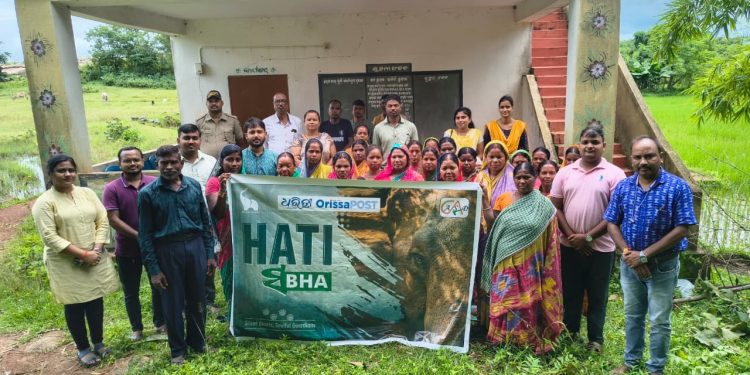Baripada: The human-elephant conflict in Mayurbhanj district is intensifying due to forest food shortages and poaching threats, forcing elephant herds into villages and towns.
These encounters often lead to casualties on both sides, with frustrated locals resorting to harmful methods like poisoning and live electric wires, further endangering the endangered Schedule-I species.
In response, conservationists are calling for collaborative efforts to protect elephants. Addressing this growing crisis, premier vernacular daily Dharitri, English daily Orissa POST, and the Vikas Sathi organisation, in partnership with the Vana Suraksha Samiti of Badadeuli village in Karanjia block, held the second ‘Hati Sabha’ Thursday to discuss community-driven solutions
Also Read: ‘Hati Sabha’ launched in 10 conflict-hit dists
Elephants from neighbouring Jharkhand are migrating through rural forest patches, passing villages like Kerkera, Bhanra and Sanadeuli before moving into Keonjhar district. With no designated elephant corridor and widespread deforestation, the depletion of food sources like bamboo, Siali leaves, banana plants and banyan trees is pushing them into human settlements.
Paddy cultivation on forest foothills has also ceased, worsening the issue.
Adding to the crisis is the increased presence of poachers, forcing elephants to avoid deep forests and travel through village roads.
Attracted by the scent of locally brewed mahuli liquor and handia (rice beer), elephants often break into homes in search of food, sometimes becoming aggressive after consumption. Dr Biswajit Panda, founder secretary of Vikas Sathi, appealed to villagers for compassion, emphasising that elephants only seek food and pose no threat if left undisturbed.
He warned that continued neglect would harm biodiversity and lead to further environmental degradation. Representatives from the Odisha Forest Sector Development Project (OFSDP), Rajendra Behera and Akshaya Mohanta, stressed the need to restore elephant food sources in forests and promote livelihood opportunities in fringe villages.
They highlighted how alternative incomes could reduce dependence on harmful practices and support conservation.
Local forest official Pradeep Mohanta addressed villagers’ livelihood challenges and introduced upcoming initiatives.
Vikas Sathi also announced a pilot project offering free tailoring training for women and encouraged honey cultivation through beehive box installation to supplement household incomes.
Village Forest Council (VFC) member Purnami Naik suggested installing streetlights and high-beam torches to monitor elephant movement and enhance safety.
VFC president Golak Bihari Rout noted that farmers have abandoned cultivating 90-day paddy crops near the forests due to frequent elephant raids.
He proposed incentivising edge-of-forest agriculture to replenish elephant food supply and reduce conflict.
“If alternative livelihoods can be arranged, we can coexist with elephants in harmony,” Rout said.
Another VFC member, Sukanta Lohar, echoed the sentiment, adding that both elephant and human safety are equally important, and that forest preservation benefits all.
The programme was coordinated by Tushar Behera, Arabinda Singh, Manas Panda, Shubhasmita Panda, Chiranmayee Dixit and Baishnavi Kar.
PNN






































